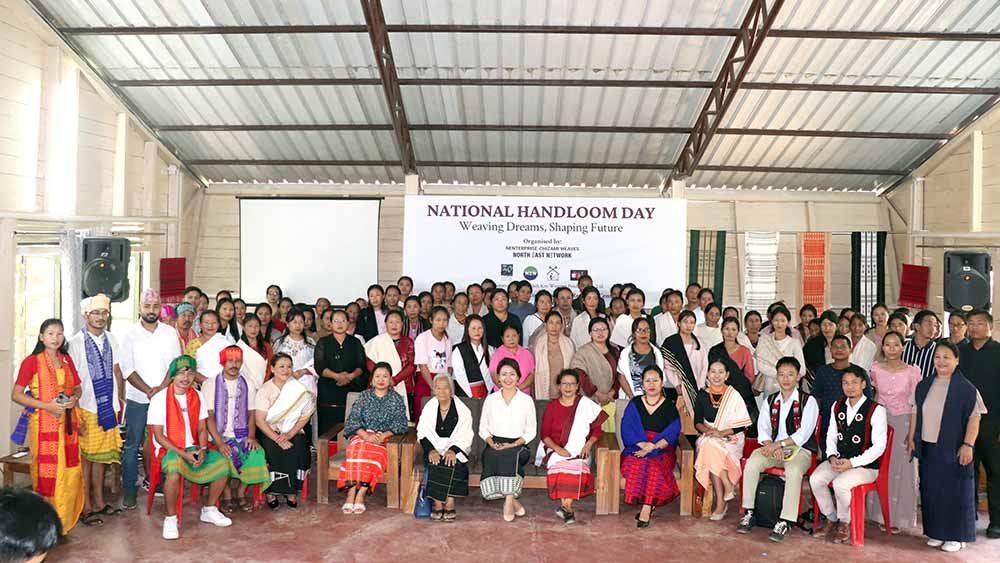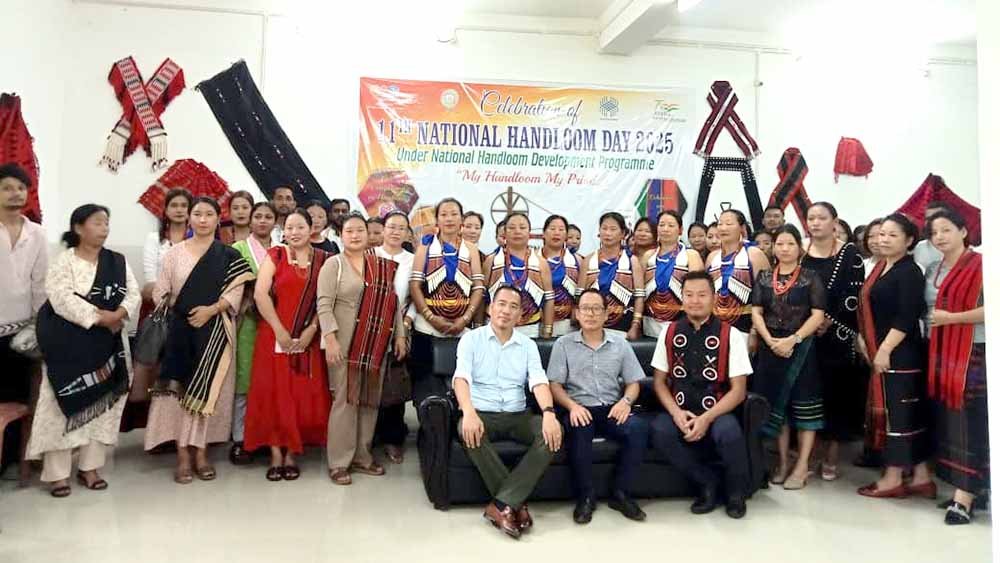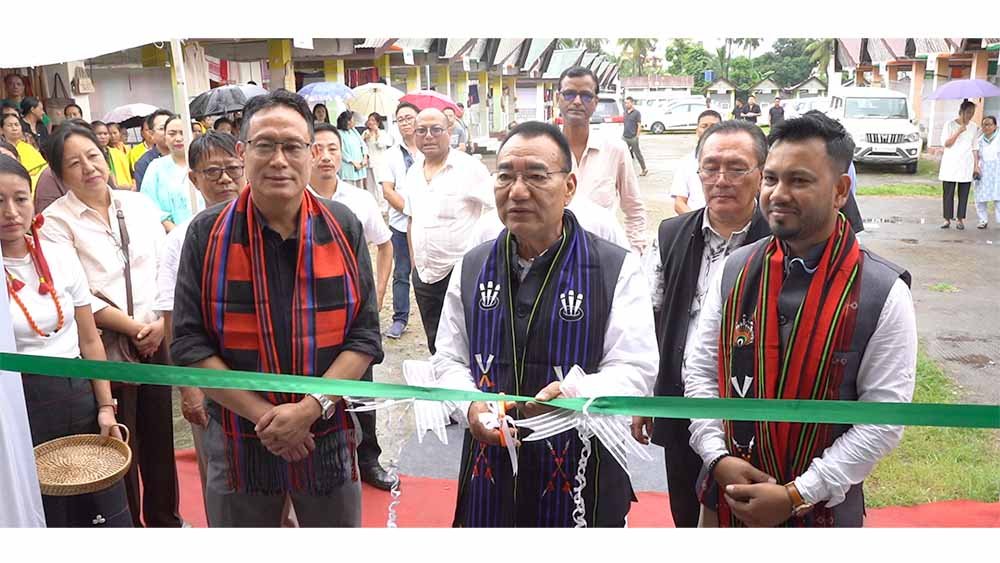WSC Dimapur and NHHDC Ltd
Along with the rest of the country, the 11th National Handloom Day was celebrated at Urban Haat, Dimapur, WEAFED Ltd conference hall Dimapur, Chizami village and Nagaland University on Wednesday to honour the handloom weaving community and highlight its importance in the socio-economic development of the country.
At Urban Haat Dimapur, Weavers’ Service Centre (WSC), Dimapur, in collaboration with the Nagaland Handloom & Handicraft Development Corporation Limited (NHHDC Ltd) observed the day with chairman of NHHDC Ltd, Praisielie Pienyu as the chief guest. Pienyu stated that the primary objective was to honour handloom weaving community for their contribution in the socio-economic development of the Handloom sector.
He highlighted that the handloom sector plays vital role in India’s economy, providing employment to over 4.3 million families, a majority of whom were women.
“The handloom industry is not just a tradition of the past, but a vibrant economic engine that empowers rural and semi-rural communities. It is a critical part of our national fabric” he stated.
Pienyu also pointed out that the Handloom National Awards would be presented by President of India, Droupadi Murmu, to honour weavers with exceptional skill, dedication and artistry, and thereby encouraged local weavers to aspire towards these prestigious awards, expressing hope that someday Naga weavers would bring such national recognition home.
“As we celebrate this day, let us pledge to weave the legacy of Indian handloom into the fabric of our daily lives. I wish you all continued stability, progress and success” he stated.
Meanwhile, delivering the keynote address, Managing Director NHHDC, Er Y Lipongse Thongtsar emphasized that handloom was not just a commodity, but an integral part of India’s history, identity, economy and livelihood.
He recalled how handloom was central to the Swadeshi movement led by Mahatma Gandhi during the freedom struggle.
“Handloom is deeply rooted in our cultural and economic identity. It is an asset that needs to be preserved for future generations” he said.
He also spoke on how the state government, through NHHDC, has been actively promoting the preservation of traditional handloom and handicrafts.
Thongtsar further maintained that handloom sector is the second-largest employment generator in the country after agriculture, further adding that that 58% of India’s handloom production comes from the North East region.
He concluded by urging all present to preserve and promote the age-old tradition of handloom weaving.
Earlier, welcome address was delivered by HoO, Weavers Service Centre, Dimapur, Biswajit Das, while vote of thanks was addressed by Deputy General Manager NHHDC, Dimapur, S Meren Ao.
After the inaugural event, live viewing of the National Handloom Award and speech of the president of India was telecasted live, after which a workshop-cum-seminar was held.
HoO, Weavers Service Centre, Dimapur, Biswajit Das, dwelled on the topic, “Technology up-gradation of Weaving, Designing, and Dyeing”, while Junior Weaver, WSC, Rimibon Beypi, dwelled on the topic, “Development of Handloom products according to the needs of the market”, and DM (DIC) Dept of Industries and Commerce, Kohima, Kiyelu Yeptho, dwelled on “Marketing promotion of handloom products”. (Staff Reporter)
Chizami Weaves

Chizami Weaves, under Nenterprise and the North East Network (NEN), in collaboration with Li Cheh Kro Weavers’ Producers’ Company Ltd., celebrated National Handloom Day 2025 at the NEN Resource Centre in Chizami Village, Phek district. Held under the theme “Weaving Dreams, Shaping Future,” the event brought together over 140 participants, including weavers, community leaders from 18 villages, entrepreneurs, educators, and government representatives.
The celebration honoured the contributions of women weavers in preserving indigenous textile heritage and promoting socio-economic development. Dr. Theyiesinuo Keditsu, poet and cultural conservationist, delivered a keynote address, urging weavers to uphold craftsmanship and originality. She emphasized the importance of passing weaving skills to younger generations and inaugurated an exhibition showcasing traditional attire, natural fibres, and handwoven textiles.
Temsusenla of Fusion Shop, Dimapur, shared her entrepreneurial journey and praised Chizami Weaves for its commitment to fair compensation and innovation. She noted the widespread presence of Chizami Weaves products in Nagaland homes.
A highlight of the event was the presentation of the Weavers Award to 31 artisans for excellence in earnings, activity and preservation of traditional hand spinning. Collectively, the weavers earned over Rs. 33.59 lakhs in wages during FY 2024–25, reflecting the initiative’s growing economic impact. Sharon Losou from India Post, Nagaland, conducted a financial literacy session, introducing schemes like PPF, SSY, and insurance plans. Participants also accessed services such as PAN and health card applications, insurance enrolment, and health screenings facilitated by the Community Health Centre, Chizami.
The official website of Chizami Weaves was launched by chairperson of Nenterprise, Seno Tsuhah, marking a milestone in expanding the initiative’s digital presence.
The event featured a table runner design competition, cultural performances by the Gidemi Weavers and The Ant team from Assam, and inspiring stories from veteran weavers. A pre-event workshop from August 4–6 engaged 103 children across six villages, introducing them to weaving and bamboo craft.
WEAFED Ltd

The Nagaland Apex Weavers & Artisans Cooperative Federation (WEAFED) Ltd observed the 11th National Handloom Day at its conference hall in Dimapur. The event was sponsored by the Office of the Development Commissioner for Handlooms, Ministry of Textiles, Government of India.
Gracing the occasion as the special guest, Deputy Registrar of Cooperative Societies (DRCS), Directorate of Cooperation, Kohima, Akangjongshi Chang, highlighted the significance of the day. He noted that National Handloom Day, observed on August 7, commemorating the Swadeshi Movement launched in 1905 to promote indigenous industries, especially handloom weaving. He emphasized the need to recognize and honor handloom workers who continue to preserve India’s cultural heritage through their skilled craftsmanship.
Chang described the handloom sector as a vital part of India’s cultural identity and a major contributor to the rural economy. He stressed the industry’s eco-friendly practices, noting the use of natural fibers, organic dyes, and minimal energy and water. “Supporting handloom means supporting sustainability, tradition, and livelihood,” he said.
“This sector not only empowers individuals but strengthens entire communities, particularly in regions like the North East,” Chang added. He called on individuals to support handloom by choosing handmade products, promoting sustainable practices, advocating for supportive policies, and passing down the tradition to future generations.
Delivering the welcome address, WEAFED Managing Director Gwaruno Khing reminded attendees of the historical importance of the Swadeshi Movement and how it connects with the handloom tradition in Nagaland and the Northeast. “Our weavers carry forward a unique legacy designs that reflect our identity, tribe, and generations of wisdom,” he said.
He also highlighted the significant role of women in the handloom sector, with over 70% of workers being women. “The handloom industry is not just about textiles, it is about identity, sustainability and dignity,” he added, urging everyone to celebrate and promote handloom by wearing, gifting, and preserving it.
Textile consultant Er. Ninoto Zhimomi also delivered a short speech on the significance and usage of heirloom handlooms. He touched upon the concept of ‘Pehchaan link,’ which he described as vital to understanding and sustaining the value of traditional handwoven crafts. (Staff Reporter)
Nagaland University
The Committee for Indigenous Traditional Knowledge of Nagaland (ITK-N), Nagaland University organized a one-day workshop on “Crafting Culture: Skills in Weaving, Crochet, Jewellery Making and Banana Fiber Art”.
The event was graced by VC (I/C), Nagaland University, Professor Bendang Ao, as the chief guest and general manager, District Industries Centre, Mokokchung, B Asangla, as the guest of honour.
Delivering a keynote address, Inspector DIC, Mokokchung, Renbenthung Kikon, shed light on the economic and cultural potential of local handloom industries.
Delivering a short speech, Prof. Bendang Ao, lauded the initiative and urged the university community to actively participate in the revival of traditional knowledge systems.
B. Asangla, in her speech, encouraged youth engagement in traditional craft-making, highlighting government schemes and support available for artisans.
The event was chaired by Assistant Professor, Centre for Biodiversity Studies, Dr. Viheno Iralu. The programme commenced with a welcome address by Assistant Professor, Department of Botany, Dr. Neizo Puro, who emphasized the importance of connecting academia with indigenous knowledge. Special item was presented by M.A. 3rd Semester Sociology students.
The event concluded with a vote of thanks delivered by Prof. Athungo Ovung, Department of Sociology. It was followed by a workshop that included a variety of traditional and creative art forms, including handloom weaving, crochet techniques, handmade jewelry and banana fiber craft
The programme provided a platform for skill sharing, cultural exchange and the celebration of indigenous knowledge systems rooted in Nagaland’s rich cultural heritage.

